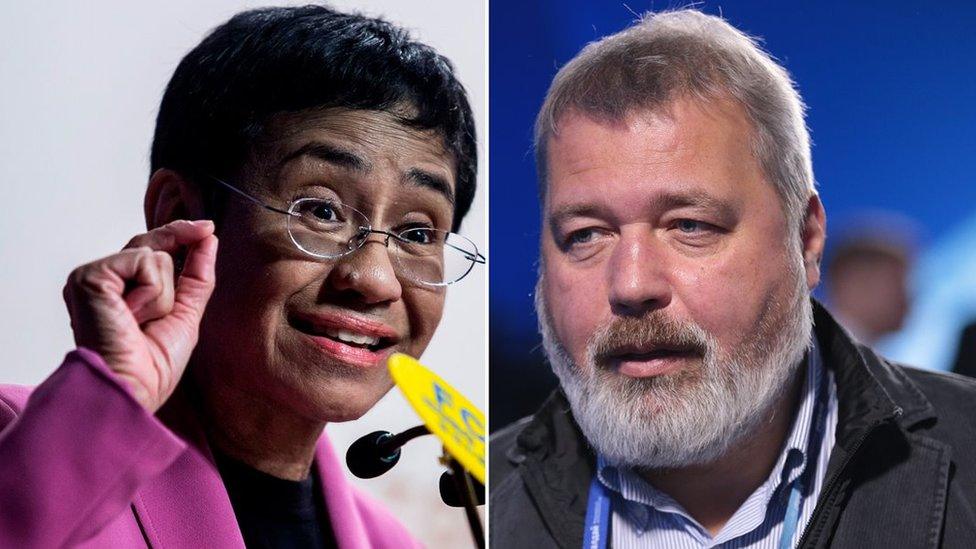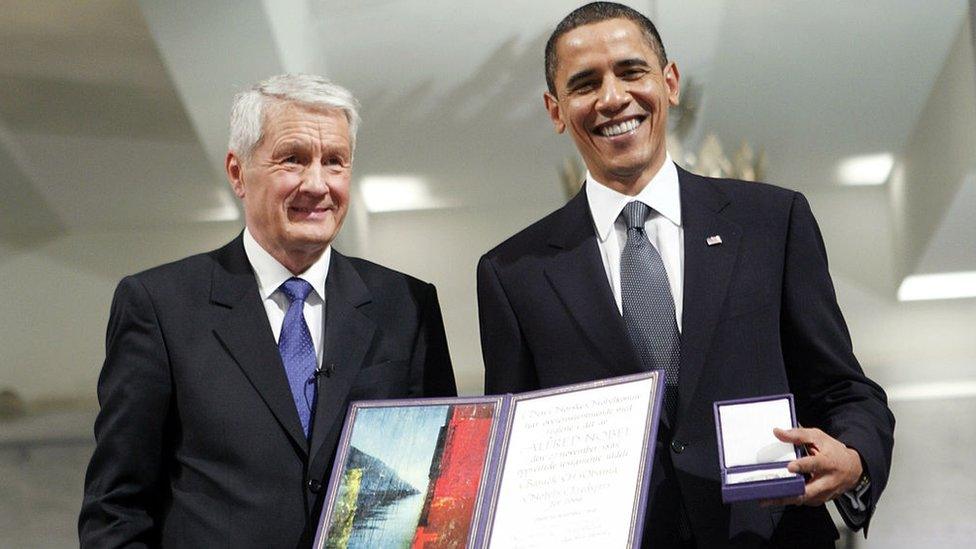Nobel prizes: Why are they so important?
- Published

Maria Ressa and Dmitry Muratov have jointly won the 2021 Nobel Peace Prize
Journalists Maria Ressa, from the Philippines, and Dmitry Muratov, from Russia, have won the 2021 Nobel Peace Prize for their "efforts to safeguard freedom of expression".
Why are the organisation's prizes so prestigious, and who are some of the previous winners?
Famous past winners

Barack Obama (right) with his Nobel Peace Prize alongside Thorbjoern Jagland, of Norway's Nobel Committee
Former US President Barack Obama won the Nobel Peace Prize in 2009,, external for "his extraordinary efforts to strengthen international diplomacy and co-operation between peoples".
President Obama said he was "surprised and deeply humbled" and would use it as a "call to action". However, there was criticism of his award, especially as he had only been in office for 12 days before the nomination deadline.
Other notable winners include former US President Jimmy Carter (2002), external; child education activist Malala Yousafzai (shared 2014); the European Union (2012); the United Nations and its then-general-secretary, Kofi Annan, (shared 2001), external; and Saint Teresa of Calcutta (1979)., external
Albert Einstein (physics 1921),, externalMarie Curie (physics 1903 and chemistry 1911),, external and Harold Pinter (literature 2005), external have also received Nobel prizes.
Two people - author and philosopher Jean-Paul Sartre in 1964, external and Vietnamese politician Le Duc Tho in 1973, external - rejected the prize, and four others were forced to decline by their countries.
In 2016, there was uncertainty over whether singer Bob Dylan would accept the literature award before he finally delivered his lecture for the prize in June 2017.
What are the prizes awarded?
The Nobel prizes are a series of annual awards given in the fields of physics, chemistry, medicine, literature, and peace.
They are awarded to people "who have conferred the greatest benefit to humankind" in the previous 12 months.
The quote is from the will of Swedish businessman - and inventor of dynamite - Alfred Nobel. He left most of his fortune in a fund to launch the awards, which were first presented in 1901.
In 1968, an economic sciences prize was added by Sweden's central bank, although it does not count as a Nobel prize.
How do they work?
Different organisations award the prize in each category every year. Five of the six are chosen in Sweden, while the Nobel Peace Prize is selected in Norway.
Academics, university professors, scientists, previous winners and others all submit nominations. Under the Nobel Foundation's rules, the shortlists are not allowed to be published for 50 years.
Prize winners are called laureates, to signify the laurel wreath given to victors of contests in ancient Greece.
More than one, but no more than three, people can win each prize.
How do you choose a Nobel Prize winner?
There have been some years when the prize has not been awarded - mostly during the two world wars.
And Nobel Foundation rules state if nobody deserves the prize in a particular category, it is not awarded and its prize money is kept for the following year.
What do the winners receive?
The recipient of each prize receives three things:
a Nobel diploma, each of which is a unique work of art
a Nobel medal, which have some differing designs
a cash prize of 10m Swedish krona (£836,000; $1.1m) - which is split between winners when there is more than one. They have to deliver a lecture to receive the money
The prizes are presented at ceremonies on 10 December, the anniversary of Nobel's death, in Stockholm and Oslo.
What have some prize winners bought with their winnings?
Marie and Pierre Curie used their physics prize money in 1903 for further scientific research, and 2006 physics winner John Mather donated his cash to his foundation.
In 1993, British biochemist Richard Roberts spent his medicine winnings on a croquet lawn, while fellow 1993 laureate Phillip Sharp bought a 100-year-old Federal-style house. The 2001 medicine winner, Sir Paul Nurse, bought himself a high-end motorbike.
Meanwhile, 2006 literature laureate Orhan Pamuk established a museum in Istanbul.
Who are the 2021 winners?
Medicine: David Julius and Ardem Patapoutian
Physics: Syukuro Manabe, Klaus Hasselmann and Giorgio Parisi
Chemistry: Benjamin List and David MacMillan
Literature: Abdulrazak Gurnah
Peace: Maria Ressa and Dmitry Muratov
Economics: David Card, Joshua Angrist and Guido Imbens